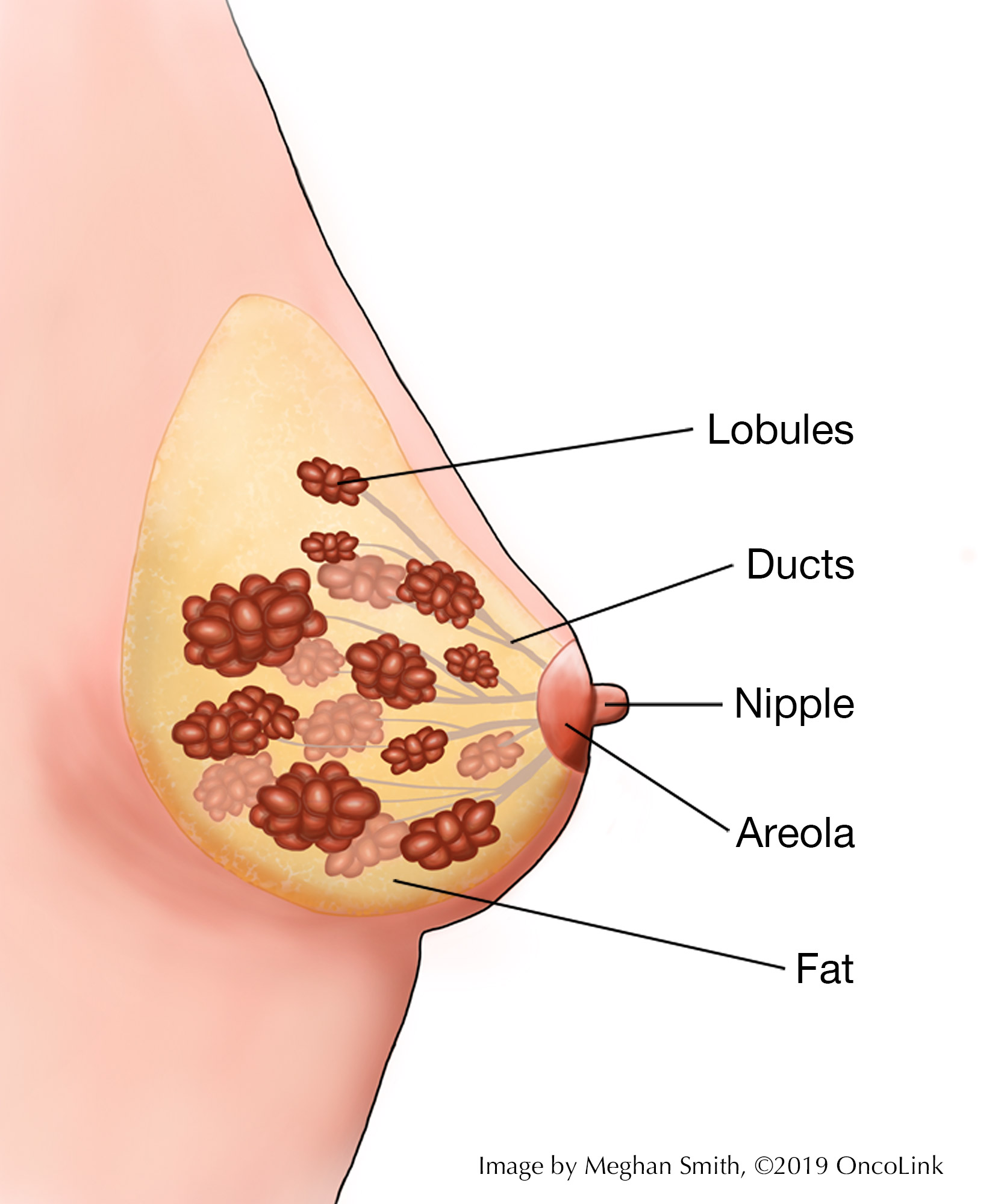Breast Cancer: The Basics
Breast cancer is caused by cells in the breast growing out of control. As the number of cells grows, they form a mass (tumor). There are many types of breast cancer, such as:
- Invasive Ductal Carcinoma
- Cancer cells grow from the ducts in the breasts.
- Invasive Lobular Carcinoma
- Cancer cells grow from the lobes of the breasts.
- Ductal Carcinoma In-Situ (DCIS)/Lobular Carcinoma In-Situ (LCIS)
- Cancer cells found in breast tissue.
- Unlikely to spread to other tissues.
- DCIS cells can enter the breast tissue (called invasive), and should be treated.
- LCIS is a marker for a greater risk of breast cancer, but does not need to be treated.
Breast cancer that has spread from the breast to another part of the body is called metastatic cancer.
Risks
There are some risks that may add to your chance of getting breast cancer, such as:
- Being older in age.
- Earlier age when your period starts.
- Older age when you first become pregnant.
- Use of hormone replacement therapy (HRT).
- Having dense breast tissue.
- Having other people in your family who have had breast cancer.
- Genetic mutations, such as BRCA1 and BRCA2.
- Having had radiation to the chest.
- Having breast cancer in the past.
- DES (a synthetic estrogen) use.
- Drinking more than 5 drinks (beer, wine, liquor) per week.
- Being overweight.
- Not exercising.
Breast cancer also happens in men, though not as often as in women. Things that may add to your risk for breast cancer as a man are:
- Having other people in your family who have had breast cancer.
- Having Klinefelter’s syndrome.
- Being of Jewish descent.
- Having mumps orchitis (swollen testicles).
- Estrogen (hormone) treatment.
- Obesity.
- Liver disease.
- Having radiation in the past.
- Drinking a lot of beer, wine, or liquor.
Screening
There are guidelines about when to start routine screening for breast cancer. These vary based on your age and health history. Screening is done with a mammogram, which is an x-ray of the breast. This test can find breast cancer when it is small. Finding breast cancer early may help patients live longer. Speak to your healthcare provider about the steps to take and when to start screening.
Signs & Symptoms of Breast Cancer
The early stages of breast cancer may not have any signs. As the mass grows, it can cause problems like:
- A lump or hardening in the breast or underarm.
- A change in the size or shape of the breast.
- Fluid coming from the nipple or if the nipple turns inward (inverted).
- Redness or scaling of the skin or nipple.
- Ridges or pitting of the breast (looks like an orange peel).
Diagnosis of Breast Cancer
When your healthcare provider finds something that isn't normal in the breast, they will order some testing. These might be:
- Diagnostic mammogram (like a mammogram, but more pictures are taken).
- Ultrasound.
- Biopsy, where a sample of body tissue is removed and looked at under a microscope. A pathology report has the results of the biopsy and is sent to your healthcare provider. It is a main part of planning your treatment. You can ask for a copy of this report for your records.
Staging
To guide treatment, breast cancer is "staged." The stage is based on:
- Size and where the tumor is.
- If cancer cells are found in the lymph nodes.
- If cancer cells are found in other parts of the body (called metastasis).
Stages range from stage 0 (called carcinoma in situ) to stage IV (stage 4, when the cancer has spread to other parts of the body). The stage and type of breast cancer will help your provider plan your treatment.
Treatment
Common treatments are:
- Early/Moderate Stage (0-II):
- Often, surgery is done to remove as much of the cancer as possible. Surgery can be a lumpectomy (also called breast conserving surgery) or mastectomy, and lymph node tissue sample.
- Some patients will also get chemotherapy after surgery (called adjuvant therapy) to keep the cancer from coming back (called recurrence).
- Radiation therapy is often used after breast-conserving surgery to cut down the risk of the cancer coming back.
- Hormonal therapy may be used if the growth has positive estrogen and/or progesterone receptors.
- Targeted therapy may be used if the growth has a HER-2 over expression.
- Advanced Breast Cancer (III or IV) or breast cancers that were stage 0-II when they were first found and have come back in other parts of the body:
- Surgery may be used, such as mastectomy, lumpectomy, lymph node removal, and reconstruction.
- Chemotherapy is often used in advanced cancer.
- Targeted therapies work against a certain target found on the cancer cells. They are used to treat cancers that are HER2+ as well as cancers that have other targets like mTor, CD4/CD6, and EGFR. You will be tested for these targets to decide if these therapies are a choice for you.
- Hormone therapy is used to treat cancers that are estrogen and/or progesterone receptor positive.
- Radiation therapy can be used in a few ways for advanced breast cancer, such as treatment after mastectomy, radiation to the lymph node area, and to treat tumors that are causing problems in other parts of the body.
This article is a basic introduction to breast cancer. You can learn more about breast cancer and treatment by using the links below:
Early/Moderate Stage Breast Cancer: Staging and Treatment
Advanced Stage Breast Cancer: Staging and Treatment
